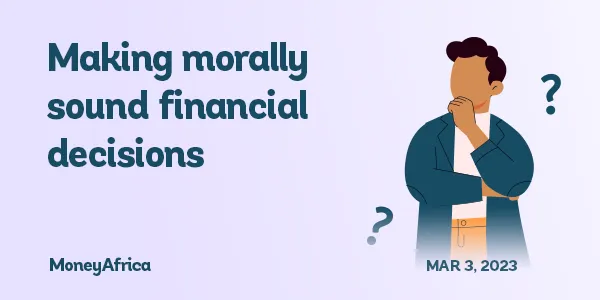Good Morning 😃
How are you doing?
Friday letters are usually dedicated to taking questions from our community. Do you have a question for us? Please feel free to
- send an e-mail to info@themoneyafrica.com; or
- send a DM to any of our social media channels, or
- simply fill out this form. Don’t worry, your responses are kept anonymous.
**
Question
What role do ethics play in financial decision-making, and how can individuals ensure that their investments align with their values?
Answer
While making financial decisions, ethics are extremely important since people must consider not only the financial outcomes of their investments but also the greater social and environmental repercussions of their actions. For instance, some people prefer investing and saving in accordance with Halal according to their beliefs.
People can take several actions to ensure their investments reflect their values. They can first investigate the businesses and sectors they hope to invest in to learn more about their social and environmental impacts. Examining their past performance on matters like sustainability, hiring procedures, and corporate governance might help with this.
Second, people might look for investment possibilities that are specifically concerned with social or environmental impact, like socially conscious mutual funds or green bonds. These investments are purposefully made to adhere to particular principles and may put social or environmental goals ahead of financial gains.
The third option is shareholder activism in which people use their ownership stake in a firm to push for social or environmental change. This may entail presenting shareholder resolutions or casting votes on resolutions that deal with topics like diversity and inclusion or climate change.
The choice to invest ultimately rests with the person who must establish their own objectives and values, and act in accordance with them. Individuals can ensure that their investments represent their ethical convictions and contribute to favourable social and environmental results by researching investments, looking for socially responsible investment possibilities, and becoming active shareholders.
***
Question
What is the most common mistake people make with their finances and how can it be avoided?
Answer
Overspending and failing to live within one’s means are two of people’s most frequent financial errors. This might result from high debt levels, trouble paying bills, and a lack of reserves for emergencies and long-term objectives.
People should make and follow a budget that accounts for their income, expenses, and financial objectives to avoid making this error. This entails monitoring their expenditure and determining places where they may cut back or stop splurging. It also entails being aware of their financial responsibilities such as making on-time bill payments and avoiding pointless fees and charges.
Setting aside money for emergencies and long-term objectives like retirement or home ownership is another crucial step. This entails setting aside a percentage of their monthly salary and recognising savings as an absolute necessity.
And last, people shouldn’t take on debt they can’t afford to repay. This includes avoiding high-interest loans and, if necessary, looking into debt management programmes or counselling.
Overall, being careful with spending, emphasizing saving, and avoiding debt that cannot be repaid are the keys to avoiding the most common financial mistakes. By following these guidelines, individuals can create a strong financial foundation and steer clear of most typical financial mistakes that might result in long-term financial troubles.
Thank you for reading Money Africa’s Blog.
Please feel free to share it.
MoneyAfrica premium plan
Are you a mid to high-income earner? Do you find communities a bit too busy? You should sign up for our premium plan.

You can learn more about that here.
***
We often get questions regarding how to plan your finances to align with your relocation plans, especially for students seeking to further their studies. As always, we have heard you, and we have put together an e-book to help you navigate this. Follow this link, to get your FREE copy of the e-book: The Japa Encyclopedia.
***
Get our annual subscription and learn more about investing safely and building a solid portfolio in 2023.
Don’t forget to:
- Join our community, if you want to smash your 2023 financial goals. It takes at least 30 days to build great habits that will last you a lifetime. So why not start now? There is a lot you can achieve.
- If you would like to document your financial journey in 2023, then our journal would be an excellent fit for you. It costs ₦7,500 (excluding delivery).
- Get a budget sheet to track your monthly expenses. Click here
- Get an investment tracker to be on top of all your investments. Click here
MoneyAfrica is a financial literacy platform. Our goal is to make everyone better with their finances.
We do this by engagements via our:
– social media handles
– platforms for paid community members (for adults and students)
– webinar sessions with corporate clients
Would you like to join any of the communities? Please click here
Would you like us to hold a webinar for your company’s staff? Please send an email to info@themoneyafrica.com

